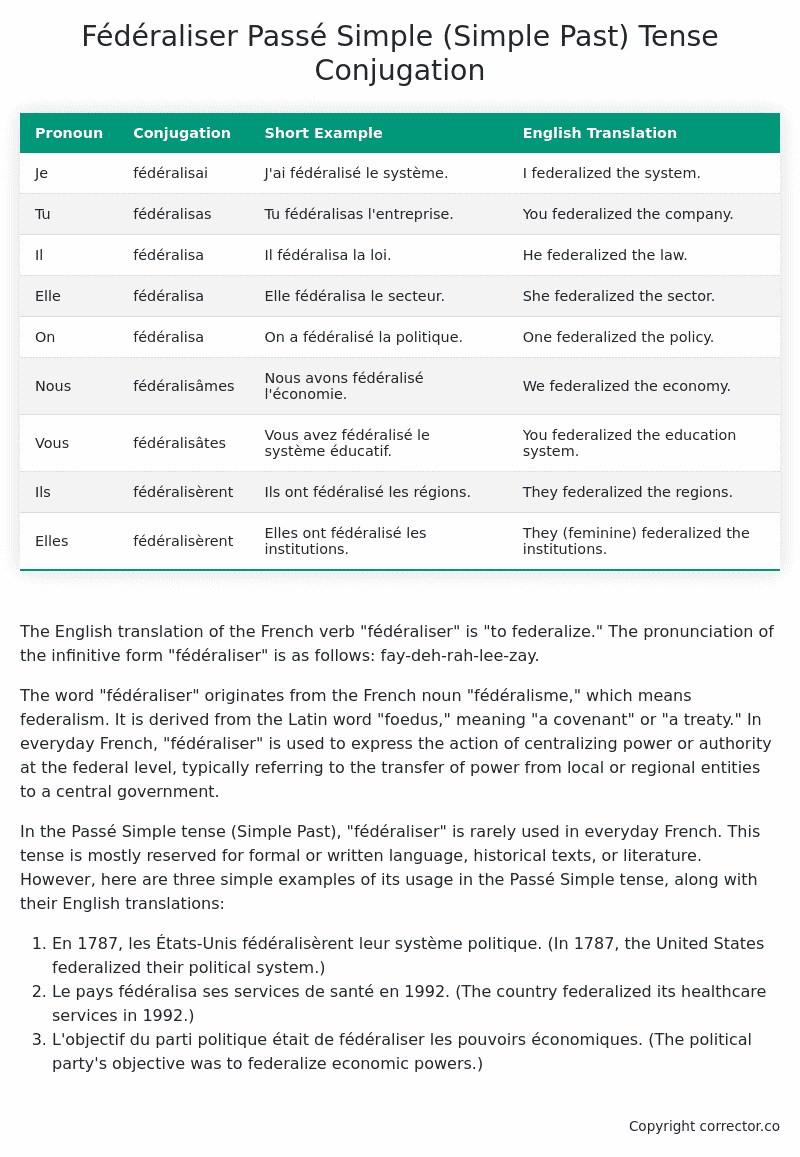Passé Simple (Simple Past) Tense Conjugation of the French Verb fédéraliser
Introduction to the verb fédéraliser
The English translation of the French verb “fédéraliser” is “to federalize.” The pronunciation of the infinitive form “fédéraliser” is as follows: fay-deh-rah-lee-zay.
The word “fédéraliser” originates from the French noun “fédéralisme,” which means federalism. It is derived from the Latin word “foedus,” meaning “a covenant” or “a treaty.” In everyday French, “fédéraliser” is used to express the action of centralizing power or authority at the federal level, typically referring to the transfer of power from local or regional entities to a central government.
In the Passé Simple tense (Simple Past), “fédéraliser” is rarely used in everyday French. This tense is mostly reserved for formal or written language, historical texts, or literature. However, here are three simple examples of its usage in the Passé Simple tense, along with their English translations:
- En 1787, les États-Unis fédéralisèrent leur système politique. (In 1787, the United States federalized their political system.)
- Le pays fédéralisa ses services de santé en 1992. (The country federalized its healthcare services in 1992.)
- L’objectif du parti politique était de fédéraliser les pouvoirs économiques. (The political party’s objective was to federalize economic powers.)
Table of the Passé Simple (Simple Past) Tense Conjugation of fédéraliser
| Pronoun | Conjugation | Short Example | English Translation |
|---|---|---|---|
| Je | fédéralisai | J’ai fédéralisé le système. | I federalized the system. |
| Tu | fédéralisas | Tu fédéralisas l’entreprise. | You federalized the company. |
| Il | fédéralisa | Il fédéralisa la loi. | He federalized the law. |
| Elle | fédéralisa | Elle fédéralisa le secteur. | She federalized the sector. |
| On | fédéralisa | On a fédéralisé la politique. | One federalized the policy. |
| Nous | fédéralisâmes | Nous avons fédéralisé l’économie. | We federalized the economy. |
| Vous | fédéralisâtes | Vous avez fédéralisé le système éducatif. | You federalized the education system. |
| Ils | fédéralisèrent | Ils ont fédéralisé les régions. | They federalized the regions. |
| Elles | fédéralisèrent | Elles ont fédéralisé les institutions. | They (feminine) federalized the institutions. |
Other Conjugations for Fédéraliser.
Le Present (Present Tense) Conjugation of the French Verb fédéraliser
Imparfait (Imperfect) Tense Conjugation of the French Verb fédéraliser
Passé Simple (Simple Past) Tense Conjugation of the French Verb fédéraliser (You’re reading it right now!)
Passé Composé (Present Perfect) Tense Conjugation of the French Verb fédéraliser
Futur Simple (Simple Future) Tense Conjugation of the French Verb fédéraliser
Futur Proche (Near Future) Tense Conjugation of the French Verb fédéraliser
Plus-que-parfait (Pluperfect) Tense Conjugation of the French Verb fédéraliser
Passé Antérieur (Past Anterior) Tense Conjugation of the French Verb fédéraliser
Futur Antérieur (Future Anterior) Tense Conjugation of the French Verb fédéraliser
Subjonctif Présent (Subjunctive Present) Tense Conjugation of the French Verb fédéraliser
Subjonctif Passé (Subjunctive Past) Tense Conjugation of the French Verb fédéraliser
Subjonctif Imparfait (Subjunctive Imperfect) Tense Conjugation of the French Verb fédéraliser
Conditionnel Présent (Conditional Present) Tense Conjugation of the French Verb fédéraliser
Conditionnel Passé (Conditional Past) Tense Conjugation of the French Verb fédéraliser
Conditionnel Passé II (Conditional Past II) Tense Conjugation of the French Verb fédéraliser
L’impératif Présent (Imperative Present) Tense Conjugation of the French Verb fédéraliser
L’impératif Passé (Imperative Past) Tense Conjugation of the French Verb fédéraliser
L’infinitif Présent (Infinitive Present) Tense Conjugation of the French Verb fédéraliser
L’infinitif Passé (Infinitive Past) Tense Conjugation of the French Verb fédéraliser
Le Participe Présent (Present Participle) Tense Conjugation of the French Verb fédéraliser
Le Participe Passé (Past Participle) Tense Conjugation of the French Verb fédéraliser
Struggling with French verbs or the language in general? Why not use our free French Grammar Checker – no registration required!
Get a FREE Download Study Sheet of this Conjugation 🔥
Simply right click the image below, click “save image” and get your free reference for the fédéraliser Passé Simple tense conjugation!

Fédéraliser – About the French Passé Simple (Simple Past) Tense
Formation
Usage
Narration
Historical Context
Interactions with other tenses
Passé Composé
Imparfait
Conditional and Subjunctive
Summary
I hope you enjoyed this article on the verb fédéraliser. Still in a learning mood? Check out another TOTALLY random French verb conjugation!


